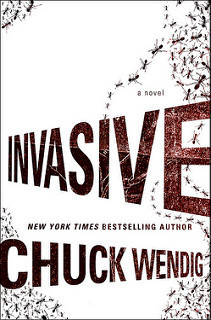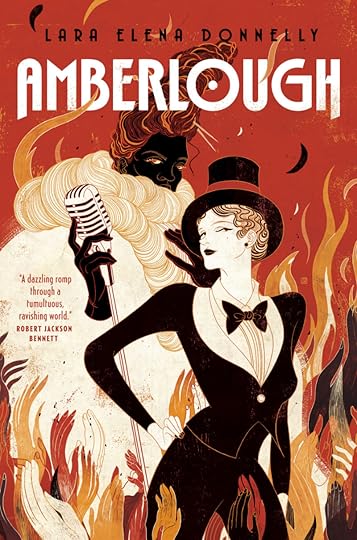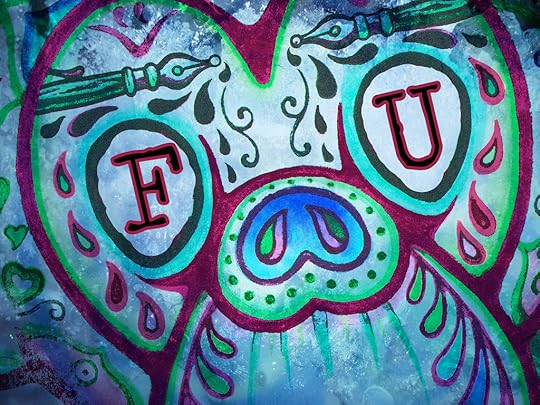Chuck Wendig's Blog, page 97
February 21, 2017
Write Unafraid, Without Fear Of Failure
I am asked sometimes how I do it.
Write books, they mean. Or finish books. Or finish a trilogy, or jump from Miriam Black to Star Wars, or switch from novels to comics and back again.
And obviously the mechanical answer to that is, you sit and you fucking do it. You say, I’m going to fucking do this thing, and then that’s the thing you try very hard to do. As I said on Twitter today, the ditch ain’t dug till you dig the damn ditch. Beyond that, I can offer a bevy of other answers, many personal to the author and not entirely applicable to every other author, and those answers deal with how you prepare the work, how you outline, how you treat characters and embrace process and whether or not you listen to music while you write or whether or not you get gin-drunk and punch a bear before you write. Or, or, or. Everybody’s different. Everybody’s got their way up, down, or through the mountain. Writers aren’t precious snowflakes until they are.
But there’s a deeper truth going on that I find vital. And it’s this:
You’re always thisgoddamnclose to failing.
Now, the nice way to put it would be: writing means taking risks. Risks are — *bites lip, narrows eyes, smolders generally* — sexy. Nngh. Yeah. Take a risk with me, baby. Drive fast. Live loose. Eat raw cookie dough naked in the saddle of a galloping velociraptor. Boom. Risks. Yes.
But I don’t necessarily want this to be sexy.
I want you to understand, some of the best — and, likely, some of the worst — fiction was written by tap-dancing right on that line separating success and failure. Or, moreover, tap-dancing across the ombre gradient that shows the swiftly sliding scale that carries a work from mediocre to good to amazing to oh fuck it’s shit now, it’s all shit, it tried to jump across the widening chasm and it fell down into the fissure and was promptly eaten by cave lizards.
Let’s talk a little about cooking.
What? I know, shut up, just — just follow the bouncing ball.
You grill a steak, what happens? You apply intense heat very quickly — you want it just right, just perfect. You want it juicy and pink on the inside, tender as anything, but on the exterior you want some color, maybe a little char. Not crispy, but done right on the outside, while almost not at all on the inside. Tender, but not mushy. Thing is, that moment of perfection is about as long as an avocado’s window of ripeness — it’s like, a minute, maybe less. You cook that steak one minute too long, and you’ve lost it. You don’t cook it enough, and you never get to where you want it. (And by the way, if you’re one of those people who wants a steak well-done, just go and eat a shoe. A burned shoe. Do not waste your money on a good steak by charring it to the consistency of an asbestos roof shingle. You monster.) A perfect steak is a golden moment. Go beyond that moment, and its deliciousness swiftly dwindles toward utter disappointment.
Or, you’re making a soup, a stew, a chili, whatever. You add spices and salt and different flavor components — you give it a taste, okay, needs more, you taste again, needs more, still not right, so you try something. You add an unusual spice, or a little vinegar, or a mystic bezoar taken from the bile duct of a young chupacabra. It’s a risk. You can’t add it without potentially ruining it, but without it — ennngh, it just isn’t right. So, you march up to that line, you stare down into the bubbling broth, and you add the ingredient. You hope you didn’t just fuck it all up. Maybe you did. Or maybe you just elevated it to something sublime.
I’m not saying anything particularly new here. The cliche, true enough as many cliches are, is no risk, no reward. Just the same, what often marks some of the greatest fiction — or, put differently, some of your favorite fiction — is a willingness on the part of the creator to take those risks, to march into the gloom of uncertainty into a place where every step might lead to a sucking mire or a starveling beastie. Some of the best work is done when it’s done by an author who knows what they’re about to do is not precisely advisable, or entirely safe, and yet they say, fuck it, fuck this, fuck that shit, I’m doing it anyway, motherfuckers. They broke a rule. They took a thing long past its expected arc. They blew up a trope or juked right when everyone else would’ve gone left. They tried something new, and it either pays off or it fails spectacularly. And honestly I’d rather read something that fails spectacularly than something that just kind of… putters along in the manner of an elderly dachshund.
Tempt failure.
March right up to it. Always write as if you’re about to fall on your face. Add fire. Bring the char. Toss in a weird ingredient. I wrote several meh books before I finally hit with Blackbirds — and when I hit with Blackbirds, it was because I had lost the capacity to care about fucking up. I felt I had already tried everything safe, everything expected. I’d already walked all the paths and followed every map and I still wasn’t writing anything of substance, so I chugged some whiskey, bit a belt, and went hard into that story because I felt like I had nothing to lose. I no longer cared if I failed. That allowed me to no longer be hesitant, to dismiss the fear of failure because I certainly wasn’t succeeding — hard-charging into that unseen fog was liberating, and it produced not only a successful book, but one whose series continues today. Using present tense inside Star Wars was controversial, in part because tie-in-fiction tends to not go that way. Some hated that choice, some loved it, and that’s where I’d rather be. I’d rather be in a place where some people love the book and some people despise it instead of everyone saying, “It was fine, sure, it was a book, and I read it, and now I forget it.”
Just as the stakes for your characters should be raised and complicated, twisted and transformed, so should you view your own stakes as storyteller.
Write unafraid. Do not be tempted by the comfort of mediocrity. Yeah, you’re going to fuck it up sometimes. (Though mind that unlike with a steak or with a stew, the book can be revised and rewritten.) Yes, your efforts to do something that is uniquely you and totally untested will sometimes lead to a narrative car crash. That is as it should be. I’d rather you drive me, the reader, at top speed into a wall then slowly sputter down a quiet street at 25MPH.
Your best authorial self is always one about to ruin the story.
That sounds bad, but I don’t think that it is.
Take the risks.
Get ready to mess it all up.
Leap toward foolishness the way a stunt pilot plunges the plane toward the ground.
Always be leaning toward failure. Get ready to fall. Tell stories that are bold and strange. Make moves that feel dangerous and uncertain. Confidently assert your own chaos as you discard fucks over your shoulder like a cruel child plucking the legs from a captive centipede.
I want you to go for it.
Whatever it is you’re afraid of, go for it.
Whatever fears you have, step over them.
Whatever twists you can take, take them.
Sometimes this thing we do, it’s an act of closing your eyes and falling backward and hoping that the story reaches out with the hands of the audience and it catches you. And sometimes, that won’t happen. Sometimes you’ll crack your head like an egg on the pavement. But fuck it, fall anyway. Trust yourself. Enjoy the plunge.
Star Wars: Empire’s End (Aftermath #3) Has Arrived
Woo!
It’s done.
It’s here.
*deep breath*
*long exhale*
Finally, the epic tale of one liverwurst burrito can be told.
*checks notes*
Wait, that’s not right at all.
OH OH OH I KNOW I KNOW
It’s time for Star Wars: Aftermath: Empire’s End: Wait I Added An Additional Colon And Now I Don’t Know What Comes After It So Let’s Just Say, Uh, Um, Journey To The Last Jedi?
Star Wars: Empire’s End: Indiebound | Amazon | B&N
The first Aftermath came out a year and a half ago in September of 2015, with me starting that novel only the January prior, and in that time I’ve written three of these things, and I honestly couldn’t be more pleased. It’s like I got to pick a literal star in this awesome galaxy and say, boop, that one’s mine. I get to own a little bit of narrative real estate in what is arguably the biggest pop culture storyworld of all time, one that I grew up with, one in which I have been brining and pickling myself since I was four years old. When someone comes up and hands you a metaphorical bowcaster and says, “We need you to finish off the Imperial Empire, so figure out how to work that thing and get to business,” yeah, yeah, hell yes I’m going to do it.
Occasionally, ahem, the journey has been a little fraught — some reaction to the first book in particular was rougher than I anticipated, and some of that is chalk-uppable to hey, not every book is for every reader, and I don’t necessarily write in the standard “tie-in fiction” style what with the present tense and such. Some of it was due to, er, other social forces, and then those social forces somehow manifested like the Stay-Puft Marshmallow Man except this one was a giant Evil Circus Peanut and then I guess oops we elected him president.
Back then I wasn’t actually sure if I wanted to write more Star Wars, but it’s been such a heady rush, and the team at Del Rey is aces, so I’d totally jump back in if invited. Meanwhile, if you want to check this one, it’s got all kinds of stuff. Hutts! Space battles! Maybe a Gungan! Jakku (that junkyard?)! Han and Leia! An auspicious birth! A huggable, cuddly murder-death-droid! References! Interludes! Sinjir being Sinjir! Wookiees! Stars! Wars! And more.
If you wanna read a short interview with me over at Sci-Fi Now about the experience, you may do so by making with the clicky-clicky.
Otherwise, please to enjoy the book.
I’ll see you on the other side of the war.
Comments may contain spoilers, so please be advised.
February 20, 2017
Macro Monday Brings The Mystery Macros
So, though the weather was arguably a lot nicer this week than it should’ve been — I mean, it’s the middle of fucking February, usually the most heinous of the winter months, and here it’s 70 degrees out and I’m eating ice cream and wearing short sleeves — I still managed to toodle around inside the house and take some MYSTERIOUS MACRO PHOTOS.
I’ll pop that bounty in below, but real quick:
Hey, tomorrow, it’s Empire’s End.
Then next Tuesday, it’s Miriam Black’s latest, Thunderbird.
Star Wars: Empire’s End: Indiebound | Amazon | B&N
Thunderbird: Indiebound | Amazon | B&N
Also a reminder that I’m doing an event this Saturday in support of both at one of the greatest bookstores in the land, Let’s Play Books, in Emmaus, PA. 4pm on the 25th, details here. (The event is listed as 4pm – 4:45pm, but I have full confidence it’s not going to be 45 minutes only — I’ll be there long as you need me to be.)
AND NOW, MACRO WEIRDNESS. Part of the fun here will be to look at these and to try to figure out what you’re even looking at. It’s a mystery! Get in the van, Scoob! Zoinks!
February 17, 2017
Flash Fiction Challenge: Ten More Titles (Round Two!)
Okay, so, a couple weeks ago I asked you guys to come up with three-word titles, and you did, in spectacular fashion. It fueled last week’s challenge.
And, because you were prolific and I am nothing if not a tremendously lazy human being, I’m going to dip back into the well for another ten titles. Pick one or use a random number generator to choose, then write a piece of short fiction to go along with the title.
One change this time around is my picks for title are not random –
I’m hand-picking ten that sound interesting.
Also, we’ll up the word count a little.
Get writing, word-nerds.
Length: ~1500 words
Due by: Friday, Feb 24th, noon EST
Post online, give us a link in the comments.
Your ten titles to choose from (title creators in parentheses) are:
She Broke Gods (thomasmhewlett)
Gunslinger Ridge Experiment (EGUW)
Wolves of Sorrow (powerjacob)
Tomorrow’s Mirror Today (stephen cowles)
Stars That Bleed (kirajessup)
To Forbidden Passengers (lydie h)
The Porcelain Cat (d.moulou)
It Wants In (mollons)
Sincerely, Your Mortician (AN)
Burr Edge Jitterbug (m. oniker)
February 14, 2017
Is It Time, Dear Writer, To Ditch Your Literary Agent?
It used to happen once every couple of months. Then once every month, now I’m up to about once a week. What I’m talking about is, authors emailing me to see if it’s time to leave their agents.
When this happens, the writer often frames it like, “Well, how do you and your agent do things?”
And I say things like:
ME: She sells my books? I dunno, I write them, and then Stacia helps them navigate the BOILING CHAOS STORM that is the publishing industry?
THEM: But what about emails?
ME: Emails, like, Hillary’s emails?
THEM: No, does your agent answer your emails?
ME: Well, of course.
THEM: In what timeframe?
ME: A reasonable one? Actually, an unreasonably fast one, usually — within the day, sometimes within the hour. Pretty fast turnaround to questions and stuff.
THEM: She not only responds to your emails, but she responds to them quickly?
ME: She does, and in fact endures a great deal of nonsense from me, including occasional Career Freakouts and other psychological gesticulations. But given your response, I’m guessing yours doesn’t… respond at all?
And from there, we uncover a host of uncomfortable sins. And this can be for a lot of reasons. Maybe the agent is wrong for you, or you’re wrong for her. Maybe she’s too new. Maybe she has too many clients. Maybe you’re too small a client and she’s got bigger beasts to hunt. Maybe she’s a terrible agent — or maybe you need to recalibrate your needs.
I never really like to recommend that a writer leave her agent — not because that’s a bad idea, but because I’m not comfortable being the one to say, YEAH, TIME TO JUMP OUTTA THE PLANE, as that’s awfully easy for me to say, because I’m buckled up in a nice, cozy seat. Telling you to do the hard thing is easy when I don’t have to do it with you. Plus, then you jump out of the plane, get sucked into a turbine, are turned into a red mist, oops.
That said, there is a calculus involved in determining whether or not to persist in the relationship, and that calculus is different for every author. But — but! — I do think that there are things, mmm, nnny’know, you should look out for, just in case. If enough of these boxes are checked, maybe it’s time to consider moving on. Let us discuss some of these:
1. Your agent doesn’t communicate with you in a timely manner — or at all. That’s not good. Your agent is the champion of your book and ostensibly, your career. They are its babysitter — and I don’t mean that dismissively, I mean, you want your child to be in capable hands, and further, you want that babysitter to answer the phone if you would like to find out how your baby is doing. If you go weeks without hearing anything from an agent, or months, or forever, you have a problem. It probably means they forgot your baby at the mall.
2. Your agent has little idea about your career. I am a firm believer that an agent should rep more than a book — the agent reps the author and, by proxy, the author’s drinking habits I mean career. I’ve had long conversations with my agent about strategy and about different editors and publishers and genres and also about where you can get a really good margarita. Okay, the margarita thing is secondary, but just the same, my career is viewed as having a trajectory — an arc, not a single point in time — thanks to talks with my agent.
3. You pay the agent. I shouldn’t even have to say this, but if you’re paying the agent up front — as in, not a commission off sales — you probably got yourself a scammer on your hands. Remember: the money flows to the author, not away from the author. A reputable agent is one you pay a commission to — meaning, they’re only making money when you’re making money.
4. Your agent doesn’t seem to like your books. This is a thing. I’ve seen it. I don’t understand it. But any time the agent gets a new draft of your book, they tell you in words minced or unminced that they don’t like it, they can’t sell it, won’t rep it. Now, a good agent will tell you the truth about a book if it doesn’t work — it’s not their job to pass a hunk of crap up the publishing ladder just because Baby Huey will throw a tantrum otherwise. But it’s also possible there’s a very real disconnect between you and the agent in terms of what they like. Worth a look at the rest of the agent’s catalogue in terms of authors and books she reps. If you’re made to feel like an ugly duckling in a flock of preening peacocks, might be time to scout elsewhere.
5. Your agent doesn’t seem to like your chosen genres. This is also a thing. You write erotic epic choose-your-own-adventure books, your agent reps self-help books for narcoleptic parrot-owners, and ne’er the two shall meet. You want an agent familiar with the genre of what you write, not just in terms of the books themselves but also in terms of the industry circles and imprints that support that genre.
6. Your agent is not the right size. It sounds great having a rock star agent who reps mega-clients, and certainly it can be. But having known a few authors who were with some high-profile agents at the time they were debut authors, they often felt lost or under-sized in comparison — they were not, quite simply, a priority.
7. You’re doing the work. Some authors end up being the ones to pitch editors and seal deals, with the agent there mostly skimming off the success of the author. This isn’t common, but I’ve seen it happen — the author is the one doing the leg work, the submitting, the everything, and then the agent just passes along the contract and boom, 15% collected.
8. The agent seems to be on the side of the publisher, not the author. An agent who defends unethical publishing behaviors is not an agent you want to have. You certainly don’t want an agent who is hostile to publishing, and who has a realistic view of what you can get away with and what slings and arrows you’re probably going to have to suffer — further, you also don’t want to be a prima donna to the agent, acting like, WELL, YOU DIDN’T GET ME A MILLION DOLLAR ADVANCE SO OBVIOUSLY YOU LOVE THE PUBLISHER MORE THAN ME. But at the same time, an agent who seems to be more interested in protecting his relationship with the publisher than the relationship he shares with you, the author… eek, yeah, no, not good.
9. Your agent just ain’t selling your books. Something just isn’t coming together, but your books ain’t moving. Assuming you have confidence in those books, it may be time to look further afield for a new agent. It’s not a personal thing — but if a real estate agent were not helping to sell your house (or at least helping you to understand why the house isn’t selling), then some new blood may be necessary. And by “new blood” I do not mean human sacrifices, please be advised. Human sacrifices are a no-no. That’s how publishing used to work but new regulations have strictly forbidden it blah blah blah, so now it’s no longer “politically correct” to sacrifice humans and — well, it is what it is, so you may just need to find a new agent.
10. Something just isn’t right. This is an unquantifiable thing, I know, but sometimes in any relationship — things aren’t jiving. The gears keep slipping. The agent doesn’t like you. Or you don’t like him. You don’t ever feel on the same page. Something feels off, weird, like you’re forever out-of-sync. You and your agent don’t need to be friends, but this is ideally a relationship that will go on, so if something isn’t right, it’s worth figuring out what it is and if your gut is trying to tell you something.
Listen, I get it.
Getting an agent is tough. It feels wildly special, like you’ve been given the keys to the first gate of the kingdom, and you feel like losing the agent is giving away the keys. But understand now that a bad relationship with an agent is almost certainly worse than no relationship at all. And if you were good enough to get an agent on the first go around, I’d argue you have a good shot the next time, too. (Plus: self-publishing remains a viable, if crowded, arena. Though even there I’d argue you should eventually get an agent. I’ve sold some self-published stuff to publishers domestic and foreign, and that happened only because of my agent.) You need to recognize that you’re the one with the power — meaning, you’re the one with the kick-ass book that needs a home. The agent is a liaison, a loose partner, a valuable player with real insight — but the agent is not your boss. The agent is not the only agent that exists. The gate to the kingdom isn’t even real in the first damn place. You do what you gotta do for you and your book.
Before you go voting your agent off the island, though, do a few things –
First, make sure it’s not just you. Like, ask the tough questions — are you being unreasonable? Are you overreaching and creating unfair expectations?
Second, talk to some other authors — successful and unsuccessful. Ask around how they do things with their agent. Talk it through. Establish a baseline for “normal.”
Third, talk to your agent. Be upfront and honest about your concerns — politely, duh — and try to suss out what’s up. Maybe the agent feels it too. Maybe the agent can course-correct. You don’t need to throw the baby out with the bathwater. You can save the baby for later, because babies make great baby jerky when brined and smoked and dried and — wait, I’m doing the thing where I talk about eating babies again, aren’t I? Ha ha ha, my therapist told me I needed to stop doing that. *smacks self in forehead* STUPID WENDIG. STUPID STUPID WENDIG.
Then, if it’s time to truly say goodbye to your agent, you do it the right way, the correct and kind way, which is to say you gently pull the lever next to your desk and open the trapdoor beneath the agent’s feet, thus plunging them into the ACID BATH or BARRACUDA TANK that you built and –
*receives note*
*reads note*
Okay, don’t do that.
No acid baths.
No barracuda tanks.
Trap doors also a no-no, apparently.
ALL THAT AND NO BABY-EATING
FIONA APPLE WAS RIGHT, THIS WORLD IS BULLSHIT
*long sigh*
Fine, I guess what you do is, you write a nice letter and blah blah blah you let them go live on a nice farm upstate. Be sure not to procure a new agent before you end your relationship with the former, and also if you have existing books on submission or contracts in play, you need to talk to the agent to see how that gets handled. (If you have an agency agreement, it should outline that. You want to make sure that the agency gets its due for work done, but also isn’t able to invest in you or your work long after you have left them. Like with any publishing relationship, read the damn contracts and protect your booty.)
It’s hard out there in PublishingLand, so do what you gotta. As always try to approach others with empathy and compassion. Be smart, be kind, watch your six, eat your Wheaties, buy my books.
* * *
INVASIVE:
“Think Thomas Harris’ Will Graham and Clarice Starling rolled into one and pitched on the knife’s edge of a scenario that makes Jurassic Park look like a carnival ride. Another rip-roaring, deeply paranoid thriller about the reasons to fear the future.” — Kirkus Reviews (starred review)
Out now where books are sold.
February 13, 2017
Macro Monday Says To Hell With It, Have Some Dogs
Contrary to my desires last week, I did not get to scoot around the house looking for interesting macro photo opportunities, and instead we spent time playing in the snow that fell. Which means I have a new surplus of POOCH PHOTOS of our two dogs, Snoobug and Loa, to post.
So, I’mma post them below.
No, they’re not macro photos, but feel free to pretend the dogs are somehow microscopic and that I’ve just captured them up close with my magic camera.
Please to enjoy, humans.
February 10, 2017
Flash Fiction Challenge: Ten Titles From You
THE CHOICES HAVE BEEN CHOSEN.
Last week I said, hey, gimme a three-word title, and a lot of you complied. I randomly chose ten, and here are those ten (in parentheses is the creator of the title).
All Flags Fall (lbstribling)
The Gallows Girls (travishall)
Discount Skin Ticket (boydstun215)
The Last American (mags)
Guppy Must Die (jeanette hubbard)
Omen of Seven (stella winters)
Not Tonight, Honey (squeg)
One Fell Swoop (kaitlyn)
Not Today, Satan (momgoth)
Long Way Home (alisa russell)
Your job now:
Choose one either freely or with a random number generator.
Then, write a story using that title.
Length: ~1000 words
Due by: 2/17, noon EST.
Post at your online space. Give a link in the comments so we can read it.
Go write.
February 9, 2017
Lara Elena Donnelly: Five Things I Learned Writing Amberlough
Amberlough is a vintage-glam spy thriller, set in a world with all the glamor and terror of 1930s Berlin. The economy is faltering, the government is riddled with corruption, the shadow of fascism is creeping across the political landscape, and the populace is partying hard enough to ignore their precarious situation.
Secret agent Cyril DePaul has betrayed his country to protect his lover, black market kingpin Aristide Makricosta, but when he gets in over his head he turns to street-smart stripper and drug dealer Cordelia Lehane for help. As the twinkling lights of nightclub marquees yield to the rising flames of a fascist revolution, these three will struggle to survive using whatever means — and people — necessary. Including each other.
* * *
I learned a lot writing Amberlough. These five things are just the things that changed me the most. Some changed the way I approach writing. Some changed the way I evaluate relationships, the way I consume media, the way I see the world. Some of these things feel eerily, unfortunately timely.
1) The second book is harder
This is technically cheating, because it’s something I learned as I moved on to my next project after Amberlough. I remember Amberlough coming out in a giant surge of joy and inspiration and furious typing. That is not what happened. What happened is I struggled and moaned and gave up a few times and then came back, and tweaked, and reordered, and killed off some characters, brought some back to life, and ascribed different actions to different people.
I was really, really beating myself up, wondering why the next project wasn’t as easy, why it wasn’t coming out as effortlessly. The truth is: human brains are bad at remembering pain and unpleasant experiences with clarity. My brain wrapped the difficult process of novel writing in a clever disguise. Well, brain, I have news for you: it just makes the second novel harder.
2) Question your unconscious bias
Amberlough is an anachronistic novel — I based a lot of the culture on late 1920s and early 1930s Europe. Which meant I kept defaulting to familiar norms. Female secretary, male boss, white people everywhere, etc. for no particular reason. But I knew I wanted the book to be about the forcible streamlining and homogenization of a messy, diverse place. And I couldn’t do that if I didn’t start with messy diversity.
Creating a diverse fantasy world full of fair representation is a worthy pursuit, but it’s also an excellent narrative tool. Diversity instantly creates tension. For instance: Cyril, one Amberlough’s main characters, is an affluent white man from a politically-powerful, old-money family. His boss Ada Culpepper is the daughter of two black immigrants—asylum seekers from a nation essentially destroyed by Cyril’s family. Though the race and gender politics in Amberlough are different than those in our world, and even though Cyril and Ada’s differences don’t contribute directly to the plot, they don’t see the world quite the same way, and this colors every interaction between them.
Similarly, Cyril’s beard Cordelia is an orphan from one of Amberlough City’s worst slums, who works as a burlesque dancer and drug dealer. She and Cyril become close friends, but there are certain things they will never, ever understand about each other. Those things create excellent opportunities for character development. For instance, when Cyril is telling Cordelia how he became a spy:
“When I was younger,” he said, ignoring her, “it seemed so exciting. Everything was a game, and ruthlessness had a kind of . . . romantic appeal.” Then, he looked up, and his eyes widened, flashing like mercury. “I’m sorry. You’re from the Mew. I wasn’t thinking.”
She licked her teeth, tasting good tobacco and clean gin. “Nah. I ain’t pinned. We’re all idiots when we’re kids. Only difference is, I stopped being a kid a lot sooner than you.”
The shame was plain on his face, and satisfying.
3) Espionage isn’t glamorous
Ian Fleming did a great job convincing us all that spies are sexy, and Amberlough follows in those scandalous footsteps. Very seldom do spies act like James Bond. Far more often they are like le Carré’s Smiley, or even less assuming. They’re usually just normal people, gathering information that might be useful handlers who hope it’s relevant. Intelligence is built on a foundation of thousands of separate, simple reports that make one complex picture.
One of the sexiest things about espionage is that important secrets are traded among people who generally have access to them by virtue of their position in life. This means ambassadors and their families (or their lovers); old money, society journalists, high stakes gamblers; well-known authors, actors, and other famous people who travel around the world in wealthy and elevated circles.
These aren’t generally the same people who are trained in Krav Maga or sharp-shooting. More often, they’re in the camp of people reporting on seemingly banal overheard conversations that, in the context of a larger operation, can become vitally important. During World War II, for example, one man was selected as an agent for Operation Doublecross simply because he bore a startling resemblance to General MacArthur. He had no training in tradecraft whatsoever.
4) We’ll root for anybody if they’re compelling
When I sent a draft of this book to my mom, she called when she was done and asked me where I’d learned to write such awful characters. And, more than that: how had I made them so likeable?
The people in this book are not good or nice. They are scheming, manipulative, devious, selfish, secretive, meddling, violent, and destructive. They commit horrible crimes and destroy other people’s lives to save their own. But my beta readers loved them. I loved them. I reveled in coming up with new ways for them to connive and conspire. It’s amazing how invested you can become in someone’s awfulness, if you’re sympathetic to their motivation. Amazing, and a little scary.
5) Injustice has no signpost
Reading history, it’s easy to point to a juncture and say, “That’s where things went wrong. I would notice something as crazy as a rigged election, or a fascist coup, or the dismantling of democracy.” But not if it looks like business as usual. And usually, it does.
For instance, I did a lot of research about rigged elections, though much of this information didn’t end up in the book. Mostly because, like spy work, the details are a little boring.
Rigging an election is as simple as workers at certain polling places saying, “Did you bring your ID?” Or people “losing” ballot boxes. Or candidates telling bald-faced lies, saying they’ve won when they haven’t, and steamrolling any objection. Or, I don’t know, making a stink about some emails at a critical point one week before people head to the polls.
As I read my research material (sent to me by a friend who consults on electoral conflicts) I remember wondering, “That’s it? Why didn’t people…do something?” If rigged elections were decided by one momentous handshake in a dark, smoky room, I could understand—no one would see the problem to stop it. But these weren’t cloak and dagger operations. These were the end result of many banal injustices, piling up in the open.
There is no moment of “This Far and No Further.” These things happen by slow increments, a current growing swifter each moment as the river approaches the falls. Change is wrought by small actions, multiplying and metastasizing into something huge.
* * *
The all-singing, all-dancing Lara Elena Donnelly is a graduate of the Alpha and Clarion writers’ workshops. Her work has appeared in venues including Strange Horizons, Escape Pod, Nightmare, and Mythic Delirium. Her debut novel, vintage-glam spy thriller Amberlough , drops on February 7, 2017 from Tor Books. A veteran of small town Ohio and the Derby City, Lara now lives in Manhattan. You can also find her online at @larazontally or laradonnelly.com .
Lara Elena Donnelly: Website | Twitter | Facebook
Amberlough: Indiebound | Amazon | B&N | Goodreads | Book Trailer
February 8, 2017
Kameron Hurley: How to Keep Writing Through Times of Great Political Upheaval
I am never not in awe of Kameron Hurley’s writing. Whether we’re talking about her essays (ahem) or her fiction — like, say, her newest, The Stars Are Legion — I’m always eager to get my hands on the next Hurley book. Further, I’m always excited to have her here, because one day she’s going to be a literary rock motherfucking superstar, and I can say, I KNEW HER WHEN.
* * *
My grandmother grew up in Vichy France, under a regime propped up by and answerable to the Nazi regime. These last few months, I’ve wished she was still alive more desperately than any time since her death. I wanted to ask her how you coped when terrible things were happening all around you.
While we understand the necessity of writing during these times, figuring out how to persist in one’s writing when everything around you is so incredibly uncertain is tougher. Uncertainty breeds anxiety, and anxiety can kill your ability to do anything but go through the motions of bare bones survival. It’s in realizing that it was the anxiety unleashed by the sudden uncertainty in this country – when will the government declare martial law? Will we become a Russian puppet-state? Did a city explode in nuclear fire overnight? – also helped me figure out how to address it. If we can’t control the world around us, at least we can control the work we do in the face of it.
So here are my coping strategies. Hopefully some of them will help you too:
Ration your news. This may seem counter-productive. We all want to stay informed! The resistance needs us! But staring at a screen that’s beaming nightmares into your eyes for hours on end isn’t helpful; it’s actively harmful, because it will convince you that the problems out there are too big to address. I subscribed to The Washington Post, which I now read once a day. That’s news enough. I use Tweetdeck to view Twitter, which allows me to mute keywords from both my feed and mentions. I’ve muted, easily, over 200 keywords at this point, and I generally add a new one or two every day or so. This has also reduced the likelihood I’ll get suckered into a fake news meme. I also don’t have a personal Facebook account, which is a blessing. I recommend that you trim and mute there as well if you want to stay on it. But, again: Facebook is where fake news and your racist Uncle Joe are, so. I dunno. Your call.
Take up a hobby you don’t need to be good at. Like many writers, writing started out as my relaxing side gig. It was something I did in my spare time, and I found it deeply soothing. When I turned pro, the mad crash of deadlines and the need to level up my writing game to compete in a crowded market made the writing, well, less soothing. Sure, it’s still fun sometimes. But it became work. I needed something else to do with my brain that didn’t require angst. Then Netflix started streaming old episodes of The Joy of Painting with Bob Ross, and I found them so relaxing to watch that my spouse got me an oil painting set for Christmas. I’ve now painted something like 16 paintings, and it’s OK that they aren’t good! I don’t owe them to anyone. No one is paying me for them. I can just enjoy getting better at a new skill. It’s deeply satisfying to watch your skills level up from one painting to the next. Painting, like learning a new language, has also changed how I view the world. I’m starting to look at the angles of things when I look at building and mountains. I pay attention to the play of dark and light. I’ve also moved on to watching other painting shows. While watching a show by William Alexander on YouTube, he says, “You must add dark. You can’t have light without the dark,” and it was what I really needed to hear right then. Find something you enjoy that you don’t have to be good at, and go do it.
Chillax on the booze and other drugs. I spent a couple months post-election drinking way too much. Bad for my health and bad for my wallet. I cut myself back to once a week again, largely by replacing the booze behavior with the painting behavior. Watch your intake and reliance on drugs right now, legal or illegal, clearly. It’s easy to make “just one more because the government has imploded” into a habit, because the government is going to be imploding for a good long while. Caffeine isn’t great for anxiety, either, so stick to those two cups of coffee a day, or go cold turkey (I’m still working on this).
Get a dog. I mean, I’m a dog person. Dogs love you unconditionally. Pets make great therapy for folks suffering from depression, anxiety, PTSD, or any combination thereof. So you could get any kind of animal: a cat, a chinchilla, a turtle. When you want to just lie around in bed and not get up, knowing that you have to get up because you’re responsible for the care of another living thing is pretty motivating. Dogs also remind you that there is love and loyalty and pure joy in the world, even if you have lost your faith in humanity. Dogs have the added bonus of making you get up to take them outside for walks, which will get you out of your chair and increase the amount of exercise you get. Recent studies even found that people with dogs tend to get more exercise, and as a result, are healthier, than non-dog owners. It’s science, people.
Do what you can. Listen, yeah, resistance is great. Change the world! We need it. But we can’t do everything, and this is going to be a long, long haul. Pace yourself. Figure out what you can do, and do that. I subscribed to 5calls.org’s newsletter, which sends you a list of five issues every week to call your representatives about. I make my calls and check the local Ohio Resistance (yes, really) calendar to see if there’s a protest downtown that I can attend. So far I haven’t made it to one of those, but it’s on my radar now. Persist.
Write your way out. The world has not fundamentally changed. Only our understanding of it. The sun still comes up. There is still the work to do. Certainly, I’ve found that my own writing has shifted in tone and scope now that my view of the world is altered. I want to write more hopeful futures, futures where bad things happen, sure, but there are still good people out there doing good work. I want to be one of the people who makes a little more light in all this dark.
Rage against the dying of the light. Listen. When I’m feeling REALLY bad, and the dogs are curled up with me in bed and the booze is gone and I don’t want to get up, I remind myself that this is what the bad guys WANT. They want me to hide in bed, to get weary, and most of all: to shut up and stop working. On the very worst days, it is pure, blinding spite that gets me out of bed, because fuck those guys. If the only way you can get out of bed and put ass in chair to work is to yell “FUCK YOU!!” repeatedly at the clouds every morning, do it. I often say aloud, “Get up, Hurley” in the same cadence one would say, “Get up, Trinity.” And it helps. It really, really does.
So get up, folks. And get back to work.
* * *
Kameron Hurley is the author of the space opera, The Stars are Legion and the essay collection The Geek Feminist Revolution, as well as the award-winning God’s War Trilogy and The Worldbreaker Saga. Hurley has won the Hugo Award, Kitschy Award, and Sydney J. Bounds Award for Best Newcomer. She was also a finalist for the Arthur C. Clarke Award, the Nebula Award, and the Gemmell Morningstar Award. Her short fiction has appeared in Popular Science Magazine, Lightspeed Magazine, and many anthologies. Hurley has also written for The Atlantic, The Huffington Post, Entertainment Weekly, The Village Voice, Bitch Magazine, and Locus Magazine. She posts regularly at KameronHurley.com.
Kameron Hurley: Website | Twitter
The Stars Are Legion: Indiebound | Amazon | B&N
Why Persist As A Writer In Times Of Such Heinous Fuckery?
So, ICYMI, in the last 24 hours:
- The GOP voted to confirm DeVos because they were unabashedly paid by DeVos
- The GOP voted to censure and rebuke Senator Warren, thus stopping her from reading the Coretta Scott King letter about Senator Sessions — they voted to silence her unanimously, which means even the so-called “maverick” McCain has fallen right in line at the feeding trough
- On CNN, Ted ‘the President called my wife ugly and said my Daddy killed JFK and I stood up to him by sitting on his lap’ Cruz told a woman with MS, “Congratulations on dealing with MS, it’s a — it’s a terrible disease, and congratulations on your struggles dealing with it.”
- On Twitter, Trump continues — with all the subtlety of a blue whale dropped out of a C-130 onto a school bus — to point the finger at the judicial branch as an enemy in need of a culling.
Soon, the GOP will just unmask themselves, revealing moist vortices of twitching fangs, and they will wantonly eat kittens and babies on live TV. They will outlaw birds and mixtapes and hope before fucking off to their moonbase while the rest of the Earth burns.
So, with this Age of Heinous Fuckery unfolding, I continue to get emails or tweets from writers who are just saying, I can’t do it, I can’t commit words to the page, I can’t muster the feeling that any of this is worth a damn. Especially with education being one of the roots of the American tree that the madmen continue to hack at, why write? Why do it? What’s the fucking point?
On Twitter, I attempted to answer that question, and I’m putting those tweets here for you to read. (You can also just click through to the full Storify post, if that’s easier for you.)
[View the story “Art As Resistance, Stories As Seeds” on Storify]


























